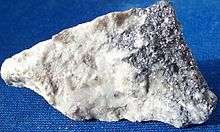galena
English

Galena
Noun
galena (usually uncountable, plural galenas)
- (mineralogy) A mineral, lead sulphide (PbS), mined as an ore for lead. [From circa 1600.]
- 1939 November, Raymond B. Wailes, Chemical Engineering for Home Experimenters, Popular Science, page 207,
- You can easily extract lead from galena, a natural mineral which has been used in crystal radio receivers.
- 1942, G. F. Loughlin, A. H. Koschmann, Geology and Ore Deposits of the Magdalena Mining District, New Mexico, Geological Survey Professional Paper, Issue 200, page 98,
- The galena of the ore contains microscopic inclusions of various forms that become visible upon polished surfaces etched with hydrochloric or nitric acid.
- 1953, National Research Council (U.S.), Report of the Committee on the Measurement of Geologic Time, page 132,
- These samples had higher Pb206 and Pb208 abundances than any other galenas yet examined.
- 2008, Sanghamitra Ghosh, Heavy Stable Isotope Investigations in Environmental Science and Archaeology, page 77,
- Very little galena has been reported (recovered mostly from burial mounds) in the Great Lakes region indicating that the mineral was not a major interregional exchange commodity during this period. However, numerous galenas have been recovered from the lower Mississippi Valley region and Florida indicating that galena was part of an important north-south exchange system (Walthall 1981).
- 1939 November, Raymond B. Wailes, Chemical Engineering for Home Experimenters, Popular Science, page 207,
- (medicine, obsolete) A remedy or antidote for poison; theriac.
- (Can we find and add a quotation of Parr to this entry?)
Synonyms
Related terms
Translations
mineral
Further reading
- “Galena” in David Barthelmy, Webmineral Mineralogy Database, 1997–.
- “galena”, in Mindat.org, Hudson Institute of Mineralogy, accessed 29 August 2016.
Latin
Etymology
Pronunciation
- (Classical) IPA(key): /ɡaˈleː.na/, [ɡaˈɫeː.na]
Noun
galēna f (genitive galēnae); first declension
- lead-ore
- 77–79, Pliny the Elder, Natural History, book 33, chapter 31:
- Excoqui non potest, nisi cum plumbo nigro aut cum vena plumbi – galenam vocant – quae iuxta argenti venas plerumque reperitur.
- It cannot be smelted, except together with lead or with the vein of lead – they call it galena – that is mostly found next to veins of silver.
- (Can we find and add a quotation of Corpus Inscriptionum Latinarum to this entry?)
- 77–79, Pliny the Elder, Natural History, book 33, chapter 31:
- (by extension) the dross that remains after smelting this ore
- (Can we find and add a quotation of Pliny the Elder to this entry?)
- 77–79, Pliny the Elder, Natural History, book 34, chapter 47:
- Huius qui primus fuit in fornacibus liquor stagnum appellatur; qui secundus argentum; quod remansit in fornacibus, galena, quae fit tertia portio additae venae; haec rursus conflata dat nigrum plumbum deductis partibus nonis II.
- That which first becomes liquid in the furnaces is called stagnum; that which is second is silver; what remains in the furnaces is galena, which forms a third portion of the added vein; when again made to fuse this gives black lead, two-ninths having been deducted.
- 77–79, Pliny the Elder, Natural History, book 34, chapter 53:
- Est et molybdaena, quam alio loco galenam appellavimus, vena argenti plumbique communis.
- There is also molybdaena, which elsewhere we have called galena, a mineral of silver and lead together.
Declension
First declension.
| Case | Singular | Plural |
|---|---|---|
| Nominative | galēna | galēnae |
| Genitive | galēnae | galēnārum |
| Dative | galēnae | galēnīs |
| Accusative | galēnam | galēnās |
| Ablative | galēnā | galēnīs |
| Vocative | galēna | galēnae |
References
- gălēna in Charlton T. Lewis and Charles Short (1879) A Latin Dictionary, Oxford: Clarendon Press
- gălēna in Gaffiot, Félix (1934) Dictionnaire Illustré Latin-Français, Hachette, page 701/2
- “galēna” on page 753/1 of the Oxford Latin Dictionary (1st ed., 1968–82)
Portuguese
Spanish
This article is issued from
Wiktionary.
The text is licensed under Creative
Commons - Attribution - Sharealike.
Additional terms may apply for the media files.